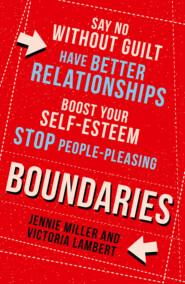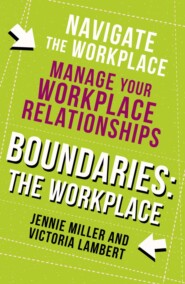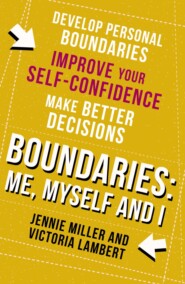По всем вопросам обращайтесь на: info@litportal.ru
(©) 2003-2024.
✖
Boundaries: Step Three: Love and Intimacy
Настройки чтения
Размер шрифта
Высота строк
Поля
Let’s look back at the stages of relationships which have got you to here – whether ‘here’ is single, dating, married, divorced, bereaved, in a happy or unhappy way. This exercise is going to require a little time and space to complete. We’d encourage you to set aside a moment when you can really think about the following questions, making notes of your answers in your Learning Journal. Remember, there are no right or wrong answers, just your personal experiences.
Consider and make a note of each of the following:
• Have you ever considered how attached you feel to your original care-givers? We’re not looking here at a simple statement like, ‘Oh yes, I loved Mum and she loved me.’ It’s time to dig a bit deeper. So, think about what that love meant and how it was expressed. Do you recall being cuddled as a child? Did that physical affection stop when you reached a certain age or are your family still demonstrative in their love? If you can’t remember, what you know of your parents in later years may help you answer that question.
• Who was your first crush, pre-puberty? This could be the girl or boy next door or it might be the singer from a teen pop group.
• Let’s look at teen love: were you the object of a crush? Did you feel popular at school in general? Did you feel isolated? Would your friends have described you as attractive, clever, sporty, cute, or idolised you in any sense? Did you get Valentine’s Day cards (not from your sympathetic family)?
• Do you recall your first foray into real dating – and was it happy? Did you feel pressurised into behaviour you weren’t ready for? Were you happy to watch from the sidelines, comfortable in your own timeframe? Did you have a reputation – positive or negative? Were you struggling with your sexuality or sense of gender? Did you have a holiday romance? Did your parents know any of this?
• Who was your first serious love – and are you still with them? If not, were they the one that ‘got away’? Did you have a faithful relationship? Were you hurt or disappointed when it came to an end, or did you initiate the break up? And were you fair in your own behaviour (looking back honestly)?
• Have you ever checked up on them or anyone else since online? Have you thought of initiating contact? Are past loves casting a shadow over your present life as well as your love life?
• Would your friends describe you as happy in love overall, or unhappy?
• Where are you now with your sexuality? Are you confident? Unsure? Or experimenting?
• If single, are you looking for love, licking your wounds, or generally fearful?
• If in a couple, are you centred and secure, worried, or resentful?
Your answers to these questions will help you as we explore how to set down some boundaries in regard to your current or future relationships and how to draw some lines regarding the past, if necessary.
In the next sections we will help you to understand current and past relationships and examine how to stay in love and improve the existing relationship you have. We will also cover what happens when it is time to make an exit as comfortably as possible, if staying really doesn’t make any sense anymore, and in Looking for Love, we cover dating.
Lastly, we will look at how the same boundaries are applicable in those non-intimate relationships with your friends and peers.
Love Limits (#ulink_34c12016-c5f0-5f62-8661-04b6b2dd1005)
We’re going to ask you to start by helping you analyse your current relationship, with a visualisation.
Take a moment and close your eyes. Inhale a few deep breaths and settle yourself.
Picture yourself at a time when you were in your first grown-up sexual relationship.
Now place yourself in a room you feel comfortable in. And bring in your past loved one.
Start picturing what boundary lies between you – is it opaque or translucent, small or large, made of recognisable material and who has control of the boundary? Is ownership of the boundary shared or singular and does that change according to time or events or needs (such as one of you suffering a bereavement and feeling vulnerable)? Is the boundary visible to others? Would the boundary look the same from either side? Or is the boundary around the two of you excluding all others (as if you are in a bubble, which is not uncommon with a first love – the intensity can be all-consuming)?
Looking back, does the situation seem happy and comfortable? Could you be looking through rose-tinted glasses or when you now recall the relationship does it make you shudder?
Come back out of your picture and write/draw all of that in your Learning Journal.
Now, let’s remind ourselves what a healthy boundary is; you may remember we compared it to the natural layers of skin – dense enough to protect and contain us, but flexible to allow for necessary movement. Do you think that is true of the boundary that you have drawn for this past relationship?
‘You can clutch the past so tightly to your chest that it leaves your arm too full to embrace the present.’
JAN GLIDEWELL
Some people may have been able to move on from first loves with ease and a natural sense of progress, be that experience good, bad, or indifferent. Others may find the first love sets a tone or standard they struggle to replicate. You may not realise how common it is to carry the baggage of even a good relationship into the next.
Вы ознакомились с фрагментом книги.
Приобретайте полный текст книги у нашего партнера:
Приобретайте полный текст книги у нашего партнера:









